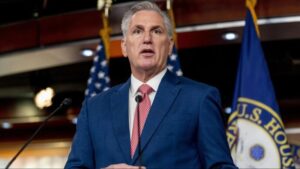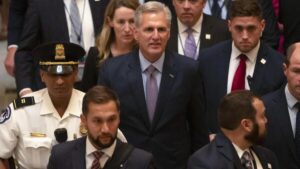Historic Upheaval: Kevin McCarthy Ousted as Speaker in Unprecedented House Vote.
Voted on Tuesday to remove Kevin McCarthy from his position as Speaker, The U.S. House of Representatives witnessed an unprecedented turn of events as dissident Republicans, in alliance with Democrats. This historic decision came merely nine months after McCarthy initially assumed the role, following extensive negotiations with the GOP’s conservative faction and 15 rounds of voting.
Following the vote, the path forward for the House remained unclear as it ventured into uncharted territory. Never before had a Speaker been ousted by the House, leaving questions about the immediate future. In response to this historic development, North Carolina Representative Patrick McHenry was appointed as the Speaker pro tempore until the election of a new Speaker, after which he adjourned the House.
The motion to vacate, filed by Florida Republican Representative Matt Gaetz the previous evening, culminated in a 216-210 vote. This vote marked the end of several months of growing dissent within a small faction of House Republicans.

Notably, eight Republican Representatives – Andy Biggs of Arizona, Ken Buck of Colorado, Tim Burchett of Tennessee, Eli Crane of Arizona, Matt Gaetz, Bob Good of Virginia, Nancy Mace of South Carolina, and Matt Rosendale of Montana – joined forces to support McCarthy’s removal. They also voted against tabling the motion, which, if approved, would have halted the process from progressing.
Conversely, Representatives Warren Davidson of Ohio, Cory Mills of Florida, and Victoria Spartz of Indiana voted against tabling but in favor of retaining McCarthy as Speaker. All present House Democrats voted in favor of declaring the Speaker’s office vacant.
Notably, there have only been three instances in history where a motion to vacate was filed – once in March 1910, another in July 2015, and the most recent one this month. This unprecedented move has left the House facing uncharted waters with an uncertain future.
Tensions Flare as Kevin McCarthy Faces Defiance Within GOP Ranks.
In a dramatic turn of events, dissident Republicans within the U.S. House joined forces with Democrats on Tuesday to push for the removal of Kevin McCarthy as speaker, a historic move that has sent shockwaves through the political landscape. This extraordinary development occurred just nine months after McCarthy’s hard-fought securing of the gavel, following intense negotiations with the GOP’s right-wing faction and a grueling 15 rounds of voting.
As the votes were counted, McCarthy seemed to acknowledge the inevitable, accepting that he would likely be ousted from his role as speaker. He expressed deep concern about the potential consequences of such a move for the functioning of Congress, emphasizing that he had maintained the support of 99% of his conference and had played a pivotal role in keeping the government operational and ensuring troops received their paychecks.
McCarthy’s decision to support a bipartisan short-term spending bill over the weekend, which averted a partial government shutdown, has been at the heart of the brewing discontent within his party. He defended this choice as the “right decision” and expressed unwavering commitment to it, even if it meant losing his position as speaker. He reiterated his determination to continue fighting for his principles.
The rift between McCarthy and hard-line conservatives, particularly Rep. Matt Gaetz and members of the Freedom Caucus, has been publicly escalating. They have accused McCarthy of reneging on a private agreement made in January, a crucial factor in his ascent to the speakership. These lawmakers have voiced their dissatisfaction with McCarthy’s subsequent negotiations with President Joe Biden in May to prevent a default on the nation’s debt and his reliance on Democratic votes to pass the short-term government spending bill.

Gaetz, in a pointed address on the House floor, called on McCarthy to disclose whether he had brokered a private deal with Biden regarding a vote on legislation for additional aid to Ukraine in its battle against the Russian invasion. He also criticized McCarthy for reportedly tying border security to these discussions, emphasizing the need for separate consideration of these crucial issues.
Meanwhile, House Democratic Leader Hakeem Jeffries released a “Dear Colleague” letter just prior to the vote, announcing that House Democrats would support the motion to vacate the chair. The outcome of this historic vote marks a significant turning point in congressional proceedings, with McCarthy’s future as speaker hanging in the balance.
House Democrats Unite with Dissenting Republicans in Historic Speaker Showdown.
In an unprecedented move fueled by discontent within the Republican ranks, a group of GOP lawmakers joined forces with House Democrats to support a motion to remove Kevin McCarthy as speaker. This historic development, occurring just nine months after McCarthy’s election to the position, is reshaping the dynamics of the House of Representatives and raising questions about the future of Republican leadership.
House Democratic Leader Hakeem Jeffries framed the decision succinctly, stating that due to the Republican Party’s unwillingness to break from the influence of MAGA extremism in a genuine and comprehensive manner, Democratic leadership would vote in favor of the pending Republican Motion to Vacate the Chair. This collaboration between House Democrats and dissenting Republicans underscores the magnitude of the divisions within the GOP and sets the stage for a potential leadership shakeup.
The dissenting Republican lawmakers who supported the motion to remove McCarthy represent a minority within the House Republican Conference. Many Republican representatives, who backed McCarthy during the vote, passionately defended his record and leadership. They emphasized that McCarthy’s decision to prevent a government shutdown by supporting a bipartisan short-term spending bill over the weekend was a responsible and necessary move.
GOP Rep. Tom Cole of Oklahoma, who presented the motion to table on behalf of McCarthy, highlighted that McCarthy acted in the best interest of the country by ensuring the government remained operational and allowing time to continue the appropriations process. He expressed frustration with the distraction posed by the motion to vacate and emphasized the need for Republicans to focus on passing the remaining appropriations bills to avoid further disruptions.
Arkansas GOP Rep. Steve Womack echoed this sentiment, deeming the motion to vacate a distraction and a “fool’s errand.” Womack, a member of the Appropriations Committee, urged his fellow Republicans to concentrate on clearing all 12 appropriations bills by the new mid-November deadline. He stressed the importance of completing legislative work efficiently and moving forward with the appropriations process.
On the other side of the aisle, Republican Rep. Dusty Johnson of South Dakota criticized the motion to vacate as a reflection of “middle school grudges” against McCarthy. He expressed concerns about the chaotic impact of these efforts on the nation and the potential negative consequences for the United States.
Meanwhile, Republican Rep. Stephanie Bice of Oklahoma expressed skepticism regarding the motivations behind the push to remove McCarthy as speaker, highlighting the complexity and diversity of perspectives within the Republican Party.
As the dust settles from this historic vote, the House of Representatives faces a new landscape marked by political divisions and uncertainties about the future of Republican leadership.
Intrigue and Division: The Motion to Vacate the Chair Stirs Up Controversy in Congress.
The halls of Congress are buzzing with controversy as Republican Rep. Matt Gaetz’s motion to vacate the chair challenges the status quo. With tensions rising and the future of Republican leadership at stake, the political landscape in Washington, D.C. is far from business as usual.
Amid the chaos, Republican Rep. Stephanie Bice of Oklahoma made it clear that the motion isn’t about the appropriations process, despite Gaetz’s assertions. She emphasized the urgency of addressing critical issues, such as government funding and aid to Ukraine, instead of diverting attention to internal disputes. Bice’s words highlight the need for Congress to prioritize its responsibilities and avoid unnecessary disruptions.
Echoing this sentiment, GOP Rep. Brian Fitzpatrick of Pennsylvania stressed the potential consequences of vacating the chair. He warned that such a move could lead to a government shutdown, damage the nation’s credit rating, and increase interest rates. Additionally, Fitzpatrick expressed concerns about the impact on Ukraine’s ability to resist Russian aggression. These remarks underscore the high-stakes nature of the motion and its potential ramifications.
Behind closed doors, Democratic lawmakers convened to strategize and provide members with an opportunity to voice their opinions on the motion to vacate. The meeting, lasting nearly 90 minutes, was marked by rounds of applause and cheers from passionate Democrats. This display of unity within the Democratic Party highlights their commitment to a shared purpose and underscores their dissatisfaction with Republican leadership.
New Hampshire Democratic Rep. Annie Kuster articulated the sentiment that trust in current Speaker Kevin McCarthy has eroded. She described the GOP’s alignment with an extreme element and lamented the prevalence of a “post-truth world.” Kuster’s comments shed light on the challenges of navigating the political landscape in an era of heightened polarization and misinformation.
Meanwhile, Congressional Progressive Caucus Chair Pramila Jayapal, a Washington state Democrat, criticized the House GOP’s inability to govern effectively. She characterized their actions as indicative of incompetence and emphasized the divisions within the Republican Party.
As the motion to vacate the chair continues to spark debate and division, the future of Republican leadership remains uncertain. The coming days and weeks will undoubtedly be marked by further political maneuvering and evolving dynamics within Congress.
Trust Deficit: How Republican Infighting Puts Speaker McCarthy on Shaky Ground.
The political turmoil within the Republican Party has left Speaker Kevin McCarthy battling for his political survival. The motion to vacate the chair, introduced by Republican Rep. Matt Gaetz, has not only exposed deep divisions but has also drawn a stark line between Republicans and Democrats.
Progressive Caucus Chair Pramila Jayapal made it clear that the Republican leadership struggle is not a problem that Democrats feel compelled to solve. She pointed to McCarthy’s repeated breaches of trust with Democrats as a key reason for their reluctance to support him. Jayapal highlighted a series of decisions by McCarthy that have strained any potential Democratic cooperation. These include his response to the January 6 Capitol attack, his abandonment of a spending agreement with President Biden, and his refusal to bring a bill providing additional aid to Ukraine to the floor.
Jayapal’s criticism of McCarthy focused on his inconsistency, as he publicly pledged one course of action only to pivot after discussions with former President Trump. She underscored McCarthy’s alignment with Trump, who she described as the instigator of the January 6 insurrection, as a significant point of contention for Democrats. For them, McCarthy’s support for Trump’s actions stands as a major obstacle to building trust.
House Democratic Leader Hakeem Jeffries emphasized the party’s commitment to prioritizing the needs of everyday Americans over political maneuvers. He urged Republican colleagues who identify as more traditional to distance themselves from extremist elements within their party. Jeffries expressed Democrats’ readiness to collaborate with GOP lawmakers but placed the onus on Republicans to join efforts to move the country forward.
Rep. Richard Neal, a Massachusetts Democrat, echoed the sentiment of distrust towards McCarthy. He stressed the importance of negotiating with trustworthy counterparts, citing a lack of evidence that McCarthy has consistently upheld his commitments.
As the motion to vacate the chair unfolds, the level of trust—or lack thereof—will play a pivotal role in determining the course of Republican leadership and, by extension, the direction of Congress. The dynamics between parties and within the GOP will continue to shape the political landscape in Washington, D.C.

Congress Walks the Financial Tightrope: McCarthy’s Role in Averting Shutdowns and Aiding Ukraine.
In the fast-paced world of American politics, congressional decisions can sway the nation’s course. Recent events surrounding government funding and support for Ukraine have highlighted the intricate dance between political parties and factions. House Speaker Kevin McCarthy, a central figure in these debates, has found himself at the heart of disputes over spending and aid for Ukraine.
As the deadline for a government shutdown loomed, Congress narrowly avoided financial chaos by passing a short-term funding bill that keeps the government operational until November 17. While this stopgap measure gained approval in both the House and Senate, it faced notable opposition within the Republican ranks. In the House, 90 Republicans opposed the bill, and in the Senate, nine Republicans voted against it.
The deal to avert a shutdown did not include additional funding for Ukraine. However, President Biden and Speaker McCarthy expressed their commitment to securing the necessary votes to pass a supplemental package aimed at providing military assistance and humanitarian relief to Ukraine. This assistance is crucial as Ukraine grapples with the ongoing threat posed by Russia.
This isn’t the first time McCarthy has collaborated with Democrats to prevent financial crises. In May, he brokered a deal with President Biden to raise the debt ceiling, ensuring that the United States did not default on its loans. The resulting legislation, known as the Fiscal Responsibility Act, established agreed-upon spending levels for the fiscal year that began on October 1.
Despite these efforts, McCarthy has faced challenges within his own party. Far-right members of the House have been critical of his leadership, even before he assumed the role of Speaker. McCarthy’s journey to the speakership in January involved 15 ballots and a four-day stalemate, as more than a dozen far-right conservatives opposed his candidacy. In order to secure their support, McCarthy made concessions, including changes to the motion to vacate that allows any member to initiate a no-confidence vote on the Speaker. He also allocated positions on key committees to far-right members and forged agreements with the House Freedom Caucus, pledging to reduce spending levels.
McCarthy’s ability to navigate these complex political waters will continue to influence the nation’s fiscal policies and responses to international crises. The delicate balance between party unity and ideological divisions will shape the trajectory of Congress in the coming months.


